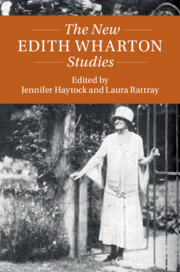Book contents
- The New Edith Wharton Studies
- Twenty-First-Century Critical Revisions
- The New Edith Wharton Studies
- Copyright page
- Contents
- Notes on Contributors
- Acknowledgments
- Editions and Abbreviations
- Introduction
- Part I Self and Composition
- Part II International Wharton
- Part III Wharton on the Margins
- Part IV Sex and Gender Revisited
- Chapter 11 Women, Art, and the Natural World in Edith Wharton’s Works
- Chapter 12 Wharton and the Romance Plot
- Chapter 13 Masculine Modernity: Fathers, Sons, and Generational Absolution in Wharton’s Fiction
- Chapter 14 Wharton’s Wayward Girls
- Bibliography
- Index
Chapter 13 - Masculine Modernity: Fathers, Sons, and Generational Absolution in Wharton’s Fiction
from Part IV - Sex and Gender Revisited
Published online by Cambridge University Press: 28 November 2019
- The New Edith Wharton Studies
- Twenty-First-Century Critical Revisions
- The New Edith Wharton Studies
- Copyright page
- Contents
- Notes on Contributors
- Acknowledgments
- Editions and Abbreviations
- Introduction
- Part I Self and Composition
- Part II International Wharton
- Part III Wharton on the Margins
- Part IV Sex and Gender Revisited
- Chapter 11 Women, Art, and the Natural World in Edith Wharton’s Works
- Chapter 12 Wharton and the Romance Plot
- Chapter 13 Masculine Modernity: Fathers, Sons, and Generational Absolution in Wharton’s Fiction
- Chapter 14 Wharton’s Wayward Girls
- Bibliography
- Index
Summary
This essay explores father figures who meditate on their relation to a dominant late nineteenth- early twentieth-century construction of active masculinity, or figures who often find themselves uncomfortably far from the era’s gender ideals. Seeing their own lives as “limited” and constrained, or akin to the era’s fears of masculine “overcivilization,” these figures find solace in an imagined trajectory of masculine accomplishment. Their sons, however, appear to them as promising to restore the family’s depleted vigor, for the younger generation appears as more self-determined and more manly, especially in professional matters. Such meditations on manhood lead to a belief in the developmental potential of the next generation, which promises to supply a long-absent manliness. Not only are the young more active men, engaged in innovative fields that were not available to their elders, but they also seem poised to recover the kind of familial masculine distinction that their elders fear that they forfeited, both for themselves and for their families.
Keywords
- Type
- Chapter
- Information
- The New Edith Wharton Studies , pp. 202 - 216Publisher: Cambridge University PressPrint publication year: 2019
- 1
- Cited by

